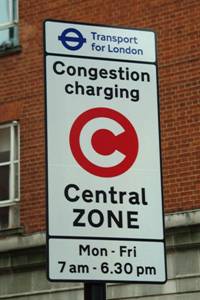From Professor Share in London:
I think this should be blogolicious! Just a few thoughts and a pic.
We often think of the UK as being the West European country most similar to the US in terms of its commitment to liberalism, with a minimal state presence in the economy. Indeed, a variety of data on taxation levels, state spending as a percentage of GDP, and even equality, confirm this common assumption. Nevertheless, recent events in the UK illustrate just how different the political climate is here when compared to the US. This week, for example, the leftist mayor of London (“red” Ken Livingstone, a fierce opponent of prime minister Blair) greatly extended the “congestion zone” requiring drivers entering the downtown area to pay an 8 pound ($16.00) fee. Upon entering the zone drivers’ license plates are photographed by cameras, and drivers must pay the fee via the web or by phone. Though deeply unpopular in greater London, over 80% of those living within the zone don’t own a car, and the funds from the congestion zone are supposedly being invested in improving the mass transit system.
There are exemptions for those driving hybrids or small gas-saving vehicles, as a way of encouraging Britons to buy “green.” The extension of the zone into wealthy West London has been very controversial. Meanwhile, the far more “moderate” Blair government is pushing for a nationwide “road pricing” scheme to tackle congestion (the UK’s roads are the most congested in Europe). Drivers will carry receivers that can be monitored by satellite, and will essentially pay by the mile for the right to drive. The government is threatening to withhold road funds from localities that don’t start planning for a road pricing scheme.
Recently, the Chancellor of the Exchequer, Gordon Brown, who will likely replace Blair in the next few months, imposed a massive tax on all short-distance airline flights, supposedly to help pay for the reduction of greenhouse gasses. The government has already implemented plans for a national identification card that all citizens will have to carry. This week the government announced that in the future all applicants for passports will have to show up for an interview with the passport office. All these recent examples serve to show that the United States is very unusual in a comparative context. US citizens are loathe to permit state intervention in the economy or in people’s daily lives, but for Europeans (even the traditional ‘liberal” British), the state plays a far more active role.
Of course, there is considerable opposition to the “nanny state” in the UK. The Liberal Democratic party (the third major UK party) has been the chief critic of what it views as the threat to individual liberties entailed by an active state. The Conservatives (now ahead in the polls) have waged a more ambivalent opposition, since on law and order issues, the Tories often support a strong role for the state. For more see http://www.timesonline.co.uk/tol/news/uk/article1408306.ece

